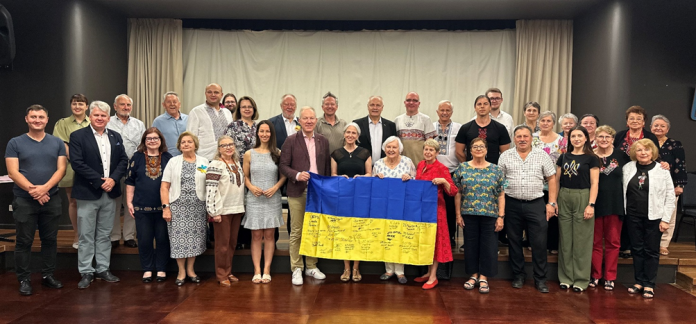This October 2025, a parliamentary delegation from Estonia embarked on an official visit to New Zealand and Australia — the largest Estonian delegation to undertake such a tour.
The delegation includes Marko Mihkelson, Chair of the Foreign Affairs Committee of the Riigikogu; Juku-Kalle Raid (MP), Henn Põlluaas (MP), and Birgit Keerd-Leppik (Chief of Staff of Committee), together with His Excellency Jaan Reinhold, Estonia’s Ambassador to New Zealand and Australia.
After meetings with political leaders in New Zealand, the delegation continued their visit in Australia, engaging with local communities and officials.
Meeting with the Ukrainian community in Sydney
On Sunday, 26 October, the delegation met with members of the Ukrainian community at the Ukrainian Youth Centre in Lidcombe, Sydney.
The Ukrainians were already gathered for a meeting involving representatives from their media, film and story production, demonstration organisers, fundraising groups, and those coordinating humanitarian support to Ukraine — all people deeply involved in assisting Ukrainians affected by the ongoing conflict.
Andrew Mencinsky, President of the Ukrainian Council of NSW, noted that many in their community were eager to hear the thoughts of the Estonian delegation. It was also acknowledged that Estonia has contributed more support per capita to Ukraine than any other country.
Why has Estonia done so much to help Ukraine?
The delegation outlined several reasons:
- Estonia understands what it means to be occupied and how devastating it is to live under Russian rule.
- The Estonian and Ukrainian peoples share many historical and cultural similarities.
- Members of the delegation have personally visited the front lines and witnessed Russian atrocities.
- From Georgia to Chechnya, Russia’s pattern of aggression has continued unchanged — it is, they said, part of its political culture.
There are about 60,000 Ukrainians in Australia’s diaspora, while Estonia is currently home to approximately 80,000 Ukrainian refugees.
A T-shirt fundraising campaign launched in Estonia has raised over 100,000 euros to support Ukraine’s defence efforts.
Europe’s unity and the war’s outlook
When asked whether Europe is becoming more or less united in its support for Ukraine, the delegation responded that support remains strong and shows no sign of weakening. However, Russia continues its propaganda and disinformation campaigns in many countries.
“We do what we have to do,” said the delegation. “It’s not just about big talk or promises — it’s about taking action and providing real, ongoing support.”
Chair of the Foreign Affairs Committee Marko Mihkelson stressed that Europe must thank Ukraine for showing leadership in unifying nations and reminding them of the importance of defending democratic values.
Solidarity and practical support
Kateryna Argyrou, Chair of the Australian Federation of Ukrainian Organisations, thanked Dr Juho Looveer and the Estonian and Baltic communities for their moral support — especially for involving Ukrainians in Sydney’s annual commemoration of the 1941 Mass Deportations. This, she said, gave Ukrainians a valuable platform to share their story. She also thanked the Sydney Estonian House for providing a venue for meetings and events.
Kateryna emphasised the need for continued advocacy from national bodies like the Council of Estonian Societies in Australia (AESL), through letters to politicians and other forms of active support.
While Australia pledged military aid such as tanks in 2023, many deliveries only occurred this year, and there has been limited new assistance in 2025. Numerous vehicles and equipment (e.g. aeroplanes, tanks and tractors) remain in Australian depots — items that could be urgently needed on Ukraine’s front lines before winter.
She also highlighted a concerning fact: in 2025, Australia became one of the largest purchasers of Russian oil globally, importing over $2 billion worth of Russian-origin petroleum products. Despite sanctions, Russian crude oil continues to reach Australian refineries via third countries such as India and China.
“Support for Ukraine,” she said, “must be measured by current actions, not past promises.”
A wider perspective
Delegation members noted that while Putin’s regime is ageing, successors with similar worldviews are already waiting in line. Younger Russians are being taught a distorted version of history — one that cements the regime’s ideology for generations.
“This is not just Putin’s war,” they said. “It’s a war driven by Russia’s leadership and its culture.”
Estonia continues to collaborate with Australian IT specialists to strengthen cyber-security and counter security threats.
The road ahead
When asked about the possible outcomes of the war, the delegation outlined two stark scenarios:
If Russia wins, it may turn its aggression towards NATO countries — a path that could lead to World War III.
If Ukraine wins, it will secure not only its own freedom but also the stability of Europe and neighbouring countries such as Georgia.
“If Ukraine does not win,” they warned, “there will be no peace in Europe.”
The delegation emphasised the importance of cultural organisations (like AESL) maintaining an active political and advocacy role to support these efforts.
Continuing engagements
Following their meetings with the Ukrainian community, the delegation travelled to Canberra for discussions with Australian politicians. They are scheduled to return to Sydney the following weekend to meet with the community at the Sydney Estonian House on Friday evening.



